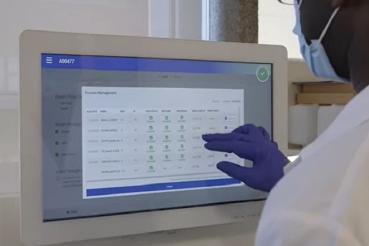Researchers at the RUSH Alzheimer’s Disease Center have been awarded a half million dollars in funding from the National Institute on Aging to help study a portable device aimed at providing emotional comfort to people with Alzheimer’s disease and Alzheimer’s disease-related dementias.
The device, Memesto, allows caregivers, family and friends to record and schedule music and customized messages in their familiar voices to help calm a patient when harmful or disruptive dementia behavior occurs. The NIA awarded its $500,000 Phase I Small Business Innovation Research grant to Edgewater Safety Systems, which produces and supplies the app and device it runs on.
The Memesto device looks to be a more affordable and non-medication-based therapy for those with Alzheimer’s disease and Alzheimer’s disease-related dementias, which are characterized by losses in memory, orientation, independent decision-making capacity and self-care.
“Personalized music and messaging have some anecdotal evidence that they help with emotional and behavioral issues in persons with Alzheimer’s and related dementias,” said Raj C. Shah, MD, a professor of family and preventive medicine and a geriatrician at the RUSH Alzheimer’s Disease Center. But he said more data was needed to provide support for the idea.
Santosh Basapur, PhD, assistant professor of family and preventive medicine and director of design at RUSH University, said Edgewater’s use of “human-centered design” makes it unique. We need, he said, “to enhance our understanding of how to efficiently deliver personalized music and messaging by informal and formal caregivers using the Memesto device.”
Up to 70% of those with Alzheimer’s disease and Alzheimer’s disease-related dementias experience acute agitation, which can worsen as the disease progresses and is characterized by behaviors like aggression, combativeness, shouting, hyperactivity, exit-seeking and disinhibition.
Personalized messages
The Memesto device uses personalized audio messages and music recorded and scheduled by loved ones and others to play at predictable times when agitation is expected during the patient’s day.
The research addresses part of an unprecedented need for therapies to improve the mental and physical health of more than 7.2 million people in the United States with Alzheimer’s disease and Alzheimer’s disease-related dementias and age-related neurodegenerative diseases. The researchers will work with dementia unit directors, nurse managers and activity directors in residential living facilities in the Chicago region, where the RUSH Alzheimer’s Disease Center has had more than 20 years of collaboration.
Family caregivers of people living with Alzheimer’s disease and Alzheimer’s disease-related dementias and agitation who participate will receive the Memesto device and training about how best to use it. After researchers gain consent and perform screenings, a two-week training period with the device will be followed by 10 weeks of data collection. The study will enroll 20 participants beginning in mid-September.
Shah and Basapur will lead the human studies clinical trial with Jeffery Banker, the principal investigator and president of Edgewater Safety Systems.
This is the first grant for Edgewater Safety Systems, Inc., founded in 2019 as a health and innovation technology company headquartered in St. Joseph, Michigan. Its mission is to improve quality of life through expertise in health care, technology innovation, engineering, robotics, automation and manufacturing.
This study is supported by the National Institute on Aging, part of the National Institutes of Health, grant number 1R43AG074725-01. The content is solely the responsibility of the authors and does not necessarily represent the official views of the NIH.




